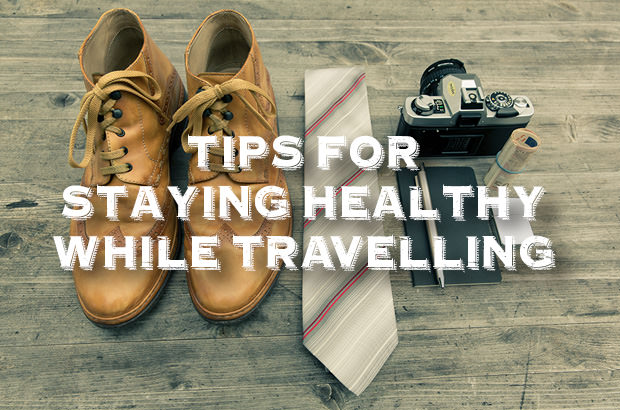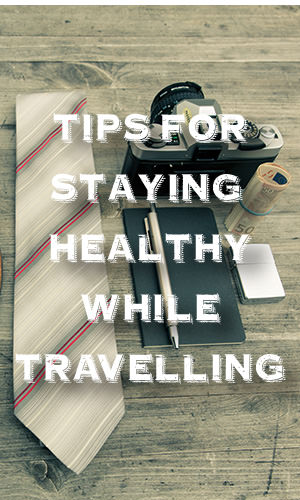
Tips For Staying Healthy While Travelling
Posted on 18 May, 2019

Being on the road and away from home can take a big toll on your health. Without access to your gym or your favourite Pilates DVD, you often end up abandoning your usual exercise routine. And whatever diet you’re on—Paleo, vegetarian, organic, low carb—there’s a high likelihood it too will end up going down the tubes. To mitigate the negative health effects of travel, we’ve put together some tips for staying healthy while on the road.
Try To Be Healthy Before Travelling

Do your best to bolster your immune system before you travel by getting lots of rest and loading up on Vitamin C and Echinacea. Travel can exacerbate whatever illnesses that are threatening. Between the dry air, tiring situations, stress and being in an enclosed environment with strangers, your little sniffle can develop into a full blown cold.
Travelling to a destination where the food is foreign to you can also cause problems. It is a good idea to boost gut health with things like probiotics before your trip.
On The Plane

Commercial airplanes have very low humidity (25%, in contrast to a comfortable home environment where the humidity level is at about 35%). This can lead to dehydration, which can cause you to become run down and more susceptible to viruses. If your nose feels dry, refresh with nasal spray—keeping the mucus membrane moist will increase its ability to fight infectious microbes.
Avoid alcohol the day before you fly and while you are flying. It can dehydrate you and leave you feeling drained. Opt for tea instead of coffee, or even better, have orange juice without any ice. Try to avoid sugar-laden food and drink until the flight’s almost over. Sugar creates dampness and phlegm, turning the back of your throat and sinuses into a Petri dish where viruses and bacteria thrive.
Being airborne in a pressurized cabin is like being really high up in the mountains. There's less available oxygen in the air and your body has to labor to get the required amount of oxygen into your bloodstream. You can counter this by taking long, easy, deep breaths.
Another risk during air travel is developing leg clots or deep vein thrombosis, a condition often brought about by long periods of immobility, dehydration and low cabin pressure. It's also known as "economy-class syndrome".
To prevent clotting, you want to create a situation where your legs are moving and the muscles are contracting. The deep veins in your legs have one-way valves, where blood can only move toward the heart. The only thing that gets that venous blood from the lower body back up to the heart is muscle contraction. Something as simple as tapping the feet will do nicely as they work your calf muscles. Your calves are often called your second heart because of the role they play in helping pump venous blood from the lower extremities.
Eat Nutritiously

This can be a real challenge when you’re staying in hotels and are on the go. Where possible, choose hotels based on their proximity to lots of restaurants. That way you won’t get yourself into a situation where you’re starving and the only thing available to eat is something that won’t make you feel well.
If you’re on the road and driving, bypass rest stops and seek out independent cafes and restaurants -- not only will you eat better, but you'll also meet locals and get a better flavor of the town you're in.
The longer your trip, the more you’ll be affected by an inadequate diet. Budget travellers often eat more carbohydrates and less protein to stretch their travel dollars. This is the root of many health problems. Protein helps you resist infection and rebuilds muscles. Eating well will keep your energy up, your blood sugar normalized and you won't be fighting a growling stomach to sleep.
Exercise good judgment if you’re at a destination where the food is questionable. For example, if you're in a developing country where your risk of food or water-borne illness is high, you'll want to pass on raw fruits and vegetables. Instead, try to find dishes that feature cooked vegetables, and make sure they're served piping hot.
Stay Active

Don’t let being on the road throw you off your exercise routine because exercise stimulates the immune system, releases endorphins and keeps your brain sharp. We don't advise trying to squeeze a set of dumbbells into your suitcase, but it's easy enough to pack a resistance band or download an exercise program onto your MP3 player so that you can work out in your room.
But rather than stay indoors, why not get out a little. Biking is a great way to burn some calories and get intimate with a destination. Cycle along scenic river banks, past vineyards, go in search of medieval towns. In some cities you can even sign up for a city running tour.
Running and biking aside, you can't go wrong with good old-fashioned walking. There's no better way to experience a city than on foot, so take time to walk between major attractions rather than jumping in a cab, bus or the subway. You'll experience the flavor of different neighborhoods and be able to duck into any cafe or shop that strikes your fancy along the way.
Get Enough Sleep

It can be hard to sleep when you are in a new environment or in a new time zone. A great way to get your body’s clock adjusted is to be outdoors and active throughout the day. For some great sleeping tips, check out: Scientifically Backed Tips For Better Sleep
Be Flexible And Adaptable

Let’s face it, things don’t always go the way we want when we’re travelling. From flight delays to reservation mixups to lost luggage and bad food experiences, travel can be nightmare.
When you're under stress, your body pH is going to become more acidic and more conducive for illness. But rather than struggle against things that are beyond your control, why not use these unpredicted events as opportunities?
Flight delayed? Maybe it’s time to catch up on those phone calls you’ve been putting off, or write that email or blog post you’ve been procrastinating on.
Meditation is also a great way to reduce stress. Rather than get yourself all worked up at an airport that is snowed in, see it as the timeout that has been eluding you. Just shut your eyes, calm your breathing, and woosah!!!
Photo Credits
Great Books For Better Health

by Alex Hutchinson

by Dr. Alejandro Junger


by Mark Divine

 A Story of Shadows
A Story of Shadows Should You Stop Exercising? A look into exercise and free radicals, and its impact on your health.
Should You Stop Exercising? A look into exercise and free radicals, and its impact on your health. A Year Without Television
A Year Without Television Great Ways To Pay It Forward
Great Ways To Pay It Forward










